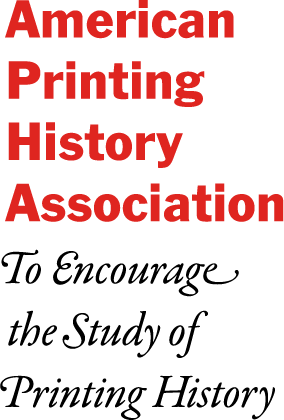Casey Smith lecture on William Ibbett
At a joint meeting of the Chesapeake Chapter and the Baltimore Bibliophiles over a dozen Chesapeake Chapter members on Saturday, June 24th to hear Chapter member and past vice president Casey Smith, present his fascinating talk “Ibbett Did It: Piquerism, Poetry, and Letterpress Printing” at the Johns Hopkins Club, in Baltimore.
William Joseph Ibbett (1858-1934) was “one of the most minor poets in an era noted for minor poetry,” but he went to great lengths to have his poetry published. He was a self-taught printer and used hobby printing presses to print exceeding poor copies of his poems. On some copies, the words were so poorly inked and broken that he felt compelled to use an ink pen to hand write over the printing to make it more legible. At times it appears that the paper he used was taken from his day job at London’s General Post Office. Some of his poetry was produced as handwritten manuscript books; not because of a desire to create a beautiful book, but because it was cheap.
However, Ibbett managed to get some of his books printed at a few notable private presses, and the famous typographic expert and Monotype Corp. publicity manager, Beatrice Warde was a fan. Warde even wrote the preface to one of his collections of poetry. As a result, but mainly through the efforts of three collectors, Ibbett’s work has found its way into rare book collections. His friend and mentor, Harry Buxton Forman, was the first of the three collectors and actively promoted Ibbett. In the middle of the 20th century, Norman Colbeck, a London book dealer, systematically collected Ibbett’s work, most of which are exceedingly scarce. (A typical run of one of Ibbett’s books was less than 200 copies.) The third collector in this chain is Chapter member Mark Samuels Lasner, one of the foremost collectors of late-Victorian art and poetry in the 21st century, and the person who initially got Casey interested in Ibbett.
Ibbett’s poetry, and life story, as detailed in his autobiography The Annals of a Nobody, reveal a complicated and troubled figure, a man who might have been responsible for the 1888 “Jack the Ripper” murders in Whitechapel, although Casey was clear that there is no definitive proof of this. However, bizarre aspects of Ibbett’s life make him a good candidate for being the Ripper. Casey made a strong point that parts of Ibbett’s story are disturbing and he did not want to make light of that.
Casey finished by reiterating his point that Ibbett’s story would be unknown if it weren’t for book collectors, and Ibbett is of interest to bibliophiles because he is so connected to the book world
Those attending the presentation received a handset letterpress broadside of Ibbett’s first poem, “The Critic to the Poet,” first published in 1889, and printed at Crooked Crow Press by proprietor Chris Manson, Denker Fellow Seth Gottlieb, and Casey Smith.
Ironically, the broadside was printed with great care to the usual high standards of Crooked Crow Press and is much better printing than anything Ibbett himself ever produced.
This first joint meeting of the APHA Chesapeake Chapter and the Baltimore Bibliophiles was a complete success with an hors d’oeuvres buffet before Casey’s absorbing talk, and plenty of time to meet new people and discuss shared interests.
Some of the APHA Chesapeake Chapter members who attended the joint meeting with the Baltimore Bibliophiles (clockwise around the table from left): Fran Durako, Mark Samuels Lasner, Steve Heaver, Pat Manson, Chris Manson, and August Imholtz.
